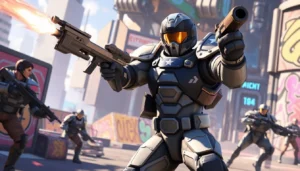Table of Contents
ToggleIn the fast-paced world of Overwatch, knowing your role isn’t just a suggestion; it’s a survival skill. Whether you’re a damage dealer looking to rack up eliminations or a support hero keeping your team alive, mastering your role can mean the difference between victory and defeat. But fear not! Overwatch role training is here to transform players from mere mortals into legends, armed with the skills needed to outplay opponents and claim that coveted play of the game.
Overview of Overwatch Role Training
Overwatch role training focuses on enhancing player skills for specific hero categories, such as damage, tank, and support. Each role plays a vital part in team dynamics, influencing game strategy and success rates. Improvement in these areas occurs through targeted exercises and gameplay analysis, which identify strengths and weaknesses.
Damage dealers maximize offensive capabilities, effectively eliminating opponents and securing objectives. Players focusing on this role learn to position themselves strategically, utilize cooldowns wisely, and communicate with teammates to coordinate attacks.
Tanks absorb damage and create opportunities for their team. Committed tank players hone abilities to protect allies, engage the enemy frontlines, and control space on the map. Practice in this role emphasizes timing for ultimate abilities and effective shield management.
Support heroes maintain the team’s health and utility, enhancing teammates’ survivability and effectiveness. Support players develop their healing strategies, utility timing, and positional awareness. Role training for this category ensures players understand when to heal, provide boosts, or activate game-changing abilities.
Incorporating team-based simulations during training fosters better communication and coordination among players. These simulations replicate real match scenarios, allowing participants to practice their roles under pressure. Progress tracking and feedback from experienced coaches further refine individual gameplay techniques.
Role-specific training materials, such as guides and tutorials, offer valuable insights into optimal hero usage and strategies. Players who engage with these resources report significant skill improvements and enhanced game understanding. Structured role training thus serves as a critical component in mastering Overwatch, allowing players to elevate their gameplay and impact matches effectively.
Importance of Role Training in Overwatch

Overwatch role training plays a vital role in enhancing player performance and team success. Mastering individual roles brings further advantages to team strategies.
Enhancing Team Dynamics
Effective communication among roles strengthens team dynamics. Each role, whether damage, tank, or support, has unique responsibilities that influence overall gameplay. Damage players focus on maximizing offensive impact. Tanks absorb damage while creating opportunities. Support heroes maintain team health and provide utility. Role training simulations involve team-based practices that allow players to experience real match scenarios. This practice encourages collaboration, helping teams learn to work together effectively under pressure. Overall, improved synergy leads to better match outcomes and higher win rates.
Improving Individual Skillset
Individual skill enhancement occurs through focused training. Each role offers unique challenges to tackle, allowing players to develop specific techniques. Damage role training emphasizes aim and positioning. Tank players refine their ability to shield allies and engage enemies. Support heroes work on strategic healing and utility management. Role-specific guides provide detailed insights into gameplay mechanics and optimal hero usage. Engaging in specialized drills helps players sharpen their skills and build confidence. Structured training resources enable players to identify strengths and weaknesses effectively, leading to continuous improvement.
Different Roles in Overwatch
Understanding the distinct roles in Overwatch is crucial for enhancing gameplay. Each role contributes uniquely to team success and strategy.
Damage Role
Damage players focus on eliminating opponents. They maximize offensive potential while positioning themselves effectively on the battlefield. Knowledge of hero abilities allows them to secure critical eliminations and create space for the team. Using mobility and awareness, they exploit enemy weaknesses. Mastery of damage heroes leads to higher kill counts and contributes significantly to overall team objectives. Role-specific training teaches optimal positioning, aiming techniques, and strategic engagements, enabling players to significantly impact match outcomes.
Tank Role
Tank players absorb damage and create front-line pressure. They protect teammates while leading engagements, establishing control over key areas. Utilizing their abilities, tanks initiate fights and disrupt enemy formations. Effective communication is essential for coordinating with damage and support roles. Mastering tank heroes involves learning when to engage or retreat, making positional awareness vital. Training focuses on shield management and crowd control techniques, empowering players to enhance team survivability and promote defensive strategies.
Support Role
Support heroes maintain team health and provide utility. Healing abilities grant teammates longevity in battles, while utility skills can turn the tide of engagements. Knowledge of positioning and map awareness is crucial for maximizing impact. Communication plays a significant role when using abilities to protect allies or set up kills. Mastery of support heroes means understanding the balance between healing and offensive support. Role training emphasizes healing throughput, positional play, and ability timing, creating opportunities for teammates to excel and secure objectives.
Effective Training Techniques
Effective training techniques enhance performance in Overwatch. Players benefit from structured approaches that focus on honing their specific roles.
Practice Routines
Players should establish consistent practice routines. Focusing on different aspects of gameplay boosts individual skills. For example, practicing positioning for damage dealers helps maximize offensive output. Regularly reviewing gameplay through recordings identifies areas for improvement. Additionally, integrating role-specific challenges can enhance decision-making under pressure. Structured drills focused on key mechanics ensure gradual skill development. Setting achievable goals during each practice session maintains motivation and drives progress.
Utilizing Custom Games
Custom games offer a flexible environment for skill development. They allow players to tailor scenarios that target specific skills, from aim training to strategy execution. Creating custom maps for specific heroes aids in understanding unique abilities. Experimenting with various team compositions helps players learn synergy and counter strategies. Moreover, inviting friends or teammates fosters collaborative practice and enhances communication. Participating in custom games encourages players to engage in practical learning while refining their techniques. Engaging in these tailored experiences leads to improved gameplay and better teamwork dynamics.
Resources for Overwatch Role Training
Numerous resources exist to enhance skills in Overwatch role training. They empower players to refine their talents for specific roles, leading to overall gameplay improvement.
Online Guides and Tutorials
Online guides and tutorials serve as valuable resources for players seeking to deepen their understanding of specific roles. Focused content addresses key strategies for damage, tank, and support heroes. Step-by-step guides outline optimal playstyles, positioning techniques, and hero synergies. Videos demonstrate effective tactics in real-time, allowing players to visualize and replicate successful strategies. Websites such as Overwatch League and community forums provide insights from high-level players. Utilizing these resources accelerates the learning process and fosters skill enhancement.
Community Coaching
Community coaching offers personalized feedback and skill development opportunities. Experienced players mentor others through structured training sessions. Each session focuses on individual strengths and weaknesses, aiming to improve performance in competitive play. Players can engage with coaches on platforms like Discord or dedicated coaching websites. Watching replays together helps identify mistakes and refine strategies. This collaborative learning environment builds confidence and enhances teamwork. Leveraging community coaching aids players in unlocking their full potential in Overwatch.
Overwatch role training plays a pivotal role in elevating players’ performance and enhancing team dynamics. By focusing on specific roles, players can refine their skills and better understand their contributions to the game. This structured approach not only fosters individual growth but also promotes effective communication and synergy within teams.
Utilizing resources like guides, tutorials, and community coaching further empowers players to unlock their potential. As they engage in tailored training sessions, they gain valuable insights that lead to improved gameplay. Mastery of each role ultimately translates into greater success in matches, making Overwatch role training an essential tool for any aspiring player.




